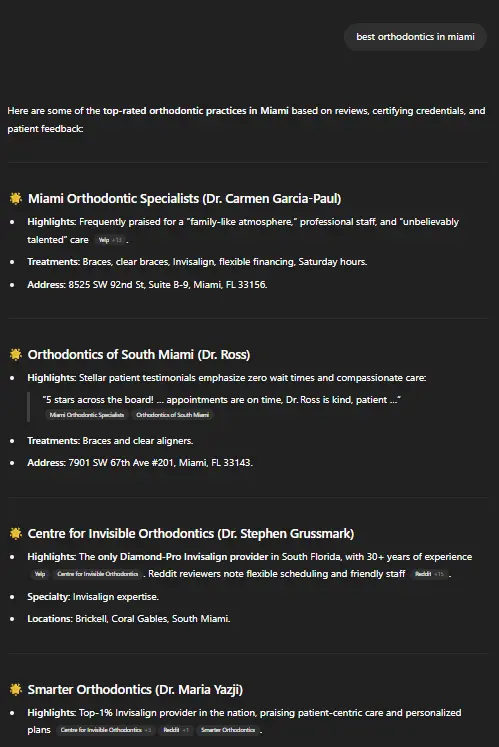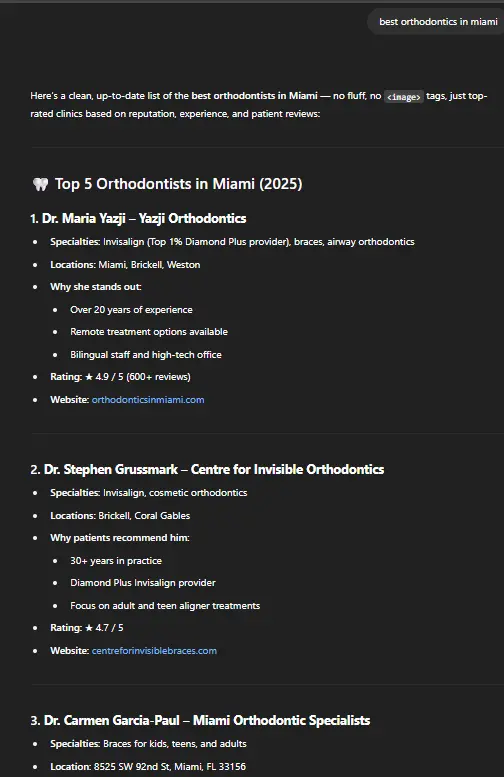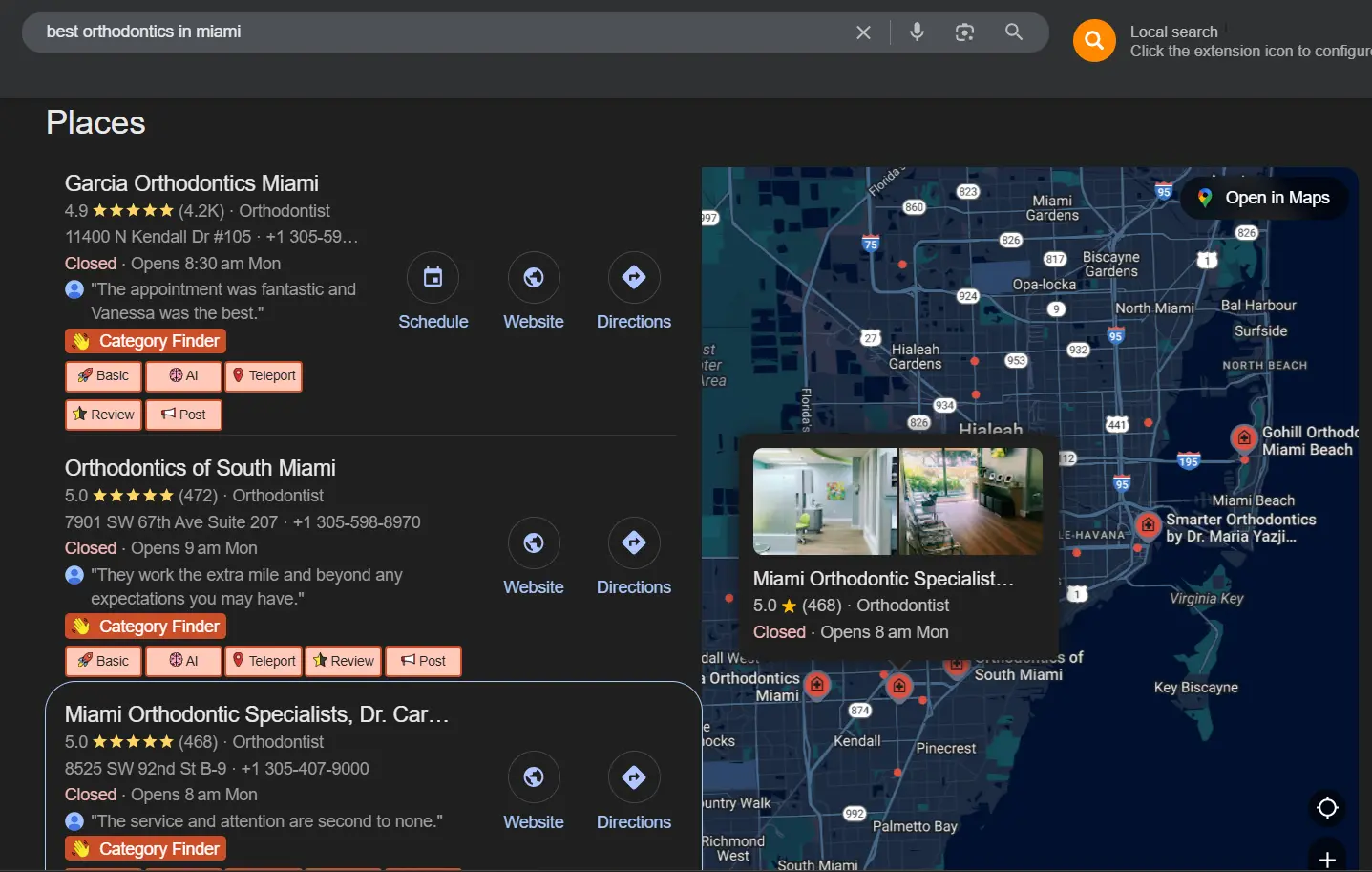With the rise of AI tools like ChatGPT, more people are turning to conversational assistants for instant answers — whether it's writing help, tech advice, or business insights. But a common question arises: If I type the same question into ChatGPT more than once, will I get the same answer every time?
Unlike traditional search engines like Google that return a fixed list of ranked web pages, ChatGPT generates responses using natural language understanding and AI models. This means it doesn't "search" the web — it creates replies based on patterns, probabilities, and context.
In this blog, we'll explore how ChatGPT processes queries, why you might see variations in responses, and how it compares to search engines when it comes to consistency and reliability.
When you ask ChatGPT a question like "Best orthodontics in Miami", the model doesn't search Google or Yelp to list local clinics in real-time. Instead, it interprets the intent behind your query — likely that you're looking for reputable orthodontists, possibly with good reviews, modern treatment options, or proximity.
Now, try slightly rephrasing that question:
- Query A: Best orthodontics in Miami
- Query B: Top-rated orthodontists near Miami with Invisalign treatment
- Query C: Who are the most experienced orthodontists in Miami?

Although all three are about orthodontic care in Miami, ChatGPT could produce different responses each time:
- One answer might describe qualities to look for in a clinic.
- Another may highlight general tips for choosing orthodontists.
- Yet another might offer hypothetical or example names, if known to the model before its knowledge cutoff.
Unlike search engines that fetch live listings, ChatGPT builds answers based on how your question is phrased — combining general knowledge, user intent, and conversational tone.
Unlike traditional search engines, ChatGPT doesn't search the internet when you ask a question. Instead, it follows a language-based reasoning process to generate a response. Here's how that works:
Step 1: Understanding the Language (Parsing Your Query)
When you type something like "Best orthodontics in Miami", ChatGPT breaks down:
- Key intent: You want recommendations or information about high-quality orthodontic clinics.
- Location context: You're specifically focused on Miami.
- Implicit needs: You may be looking for reputation, services like Invisalign, or patient experience.
It doesn't just scan for keywords like "best" or "Miami." It reads the whole sentence contextually — the same way a human would understand the question.
Step 2: Internal Knowledge Search (Not Internet Search)
Here's the key: ChatGPT doesn't "search" in the way Google does.
- Instead of fetching live results from the web, ChatGPT pulls from its training data — a mix of books, articles, websites, and factual sources available up to its knowledge cutoff (for example, June 2024).
- It doesn't rank or list live websites. It generates a response based on probability: "Given this kind of question, what's the most helpful and accurate answer?"
So if you ask:
"Who are the best orthodontists in Miami?"
It might give:
- General traits of top orthodontists
- A few known names if they were popular before its knowledge cutoff
- Tips on how to choose a provider
But it won't show live reviews, maps, or up-to-date business listings unless it's connected to web-browsing tools.
Step 3: Response Generation (Not Retrieval)
Finally, once the query is understood and the internal knowledge accessed, ChatGPT creates a response word-by-word — predicting the next most likely word based on the question and context. That's why two identical queries can have slight variations in how the answer is phrased.

Let's test how ChatGPT responds to repeated queries using a real-world example.
First Search: "Best orthodontics in Miami"
You open ChatGPT and type: "Best orthodontics in Miami"
The response might look like this:
- General tips on how to find a good orthodontist
- Mentions of factors like board certification, patient reviews, and location
- Maybe one or two names of well-known practices (if they were in the training data before the cutoff)
At this point, ChatGPT is generating an answer based on your query, using its training data and language understanding.
Second Time: Ask the Same Query Again
Now, you type the exact same question again: "Best orthodontics in Miami"

This time, the response is still relevant, but the structure and content are slightly different. You might see:
- A different introduction or wording
- More emphasis on online directories like Healthgrades or Zocdoc
- Different clinic names (or no names at all)
- Additional advice on what to look for in an orthodontist

The reason? ChatGPT doesn't retrieve a fixed list. It regenerates the response each time — kind of like if you asked a friend the same question on two different days. They'd give a similar answer, but not word-for-word the same.
🤖 Why This Happens
This variation is built into how ChatGPT works:
- It uses probabilistic language generation (not fixed search results)
- It tries to keep answers sounding fresh and human-like
- A little randomness helps prevent repetitive or robotic replies
Although both ChatGPT and Google can answer your questions, they work very differently behind the scenes — and that shows up in the results they give you.
Let's take the same example again: "Best orthodontics in Miami"
Google's Approach: Search & List
When you search this on Google, here's what happens:
- Google scans the internet in real-time
- It returns a list of ranked websites, often with a map, star ratings, reviews, and links
- The top results are usually local directories like Yelp, Zocdoc, or Google Business profiles
- You can click through to real websites and contact pages

✅ Google gives live, up-to-date listings, complete with user reviews, photos, and directions.
🤖 ChatGPT's Approach: Generate & Explain
Now ask ChatGPT the same question: "Best orthodontics in Miami"
Here's what ChatGPT will likely give you:
- A generalized answer, based on what it knows from past training (not real-time data)
- Tips on how to choose a good orthodontist
- Possibly some well-known names or clinics, if they were popular before the AI's last update
- No clickable links, reviews, or real-time location info

⚠️ ChatGPT doesn't search the web in real-time — so you won't get live updates or maps like on Google.
If your business is ranking on Google but invisible to ChatGPT, or vice versa, you're missing half the picture. Qaushik bridges that gap by helping you:
- 🔹 Optimize your content for both search engines and AI models
- 🔹 Structure your web data with SEO + AI-ready schema
- 🔹 Ensure brand consistency across websites, directories, and conversational AI
- 🔹 Create high-authority content that aligns with trusted sources ChatGPT prefers
- 🔹 Boost discoverability in both real-time search (Google) and trained AI (ChatGPT, voice assistants)
Your customers are asking questions. We make sure you're part of the answer — everywhere.
ChatGPT and search engines like Google aren't competing — they're complementing each other. The key is knowing when to use which.
Need real-time info? Google is your go-to. Whether you're checking if a local café is open, reading fresh reviews, or navigating to a new spot, Google serves you live, up-to-the-minute results pulled straight from the web.
But when you're looking to understand — not just find — something, that's where ChatGPT steps in. Think of it as your always-on, no-judgment thinking partner. It doesn't just pull links. It reads between the lines, interprets your intent, and gives you answers crafted from the knowledge it's been trained on.
Yes, ChatGPT's answers might vary from one interaction to the next. But that's not a bug — that's its superpower. It's thinking with you, not just for you.
- Google = Live facts, maps, links, and up-to-date listings.
- ChatGPT = Clear explanations, summaries, insights, and conversational answers.
- Qaushik Labs = The team that helps you win on both platforms
ChatGPT uses probabilistic language generation, meaning it creates responses word-by-word based on probability patterns. This built-in variation helps responses sound more natural and human-like rather than robotic or repetitive.
By default, no. ChatGPT generates responses from its training data up to its knowledge cutoff. It only searches the web when browsing tools are specifically enabled, and even then it uses Bing rather than Google.
Google is better for finding local businesses because it provides real-time information like current hours, reviews, directions, and contact details. ChatGPT is better for understanding what to look for in a business or getting general advice about choosing services.
While you can't control ChatGPT responses directly, you can increase your chances by building authority across multiple platforms, getting mentioned in reputable sources, and ensuring your business information is widely available and consistent online.
Both! They serve different user needs - Google for finding and ChatGPT for understanding. A comprehensive strategy should optimize for both search engines (real-time discovery) and AI models (authority and knowledge-based responses).